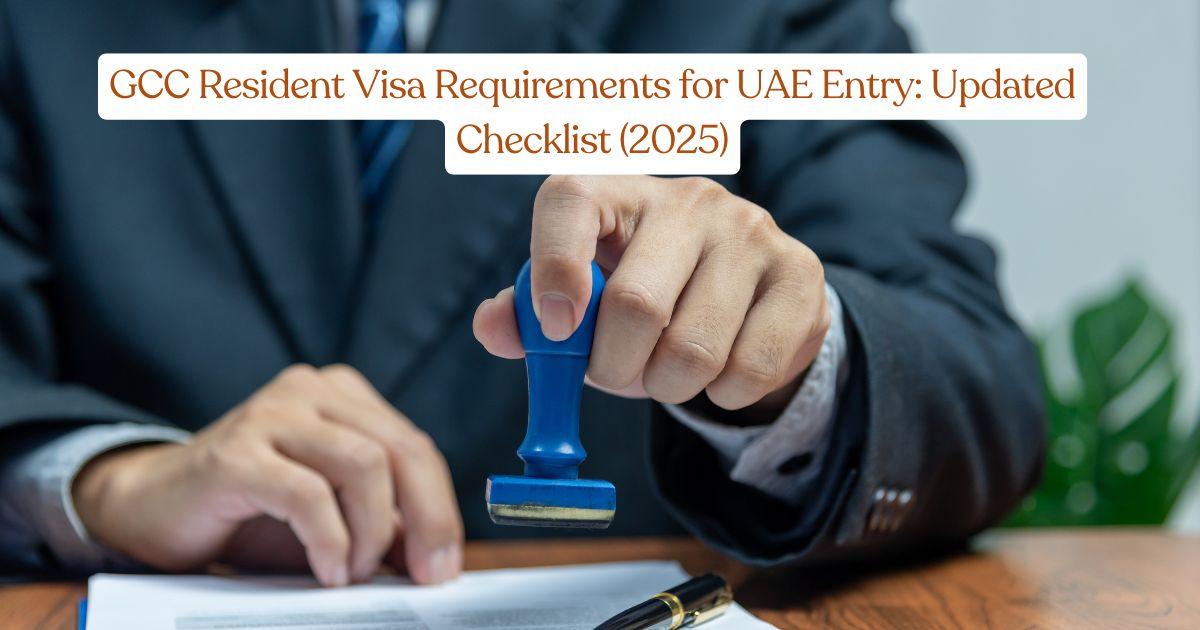Notifications

6 minutes, 25 seconds
-339 Views 0 Comments 0 Likes 0 Reviews

Planning a trip to the UAE as a resident of a GCC (Gulf Cooperation Council) country? The rules have evolved in 2025, and if you're a GCC expatriate, it's crucial to stay updated on the latest visa requirements, eligibility criteria, and document checklists. Whether you're visiting Dubai for leisure, business, or family reasons, knowing exactly what you need can save you time, stress, and unnecessary delays. This comprehensive guide provides an updated checklist for GCC residents visa requirements, profession-based eligibility, and guidance on how to apply via ICA and GDRFA portals.
GCC nationals (citizens of Saudi Arabia, Kuwait, Bahrain, Oman, and Qatar) do not require a visa to enter the UAE. However, GCC residents — expatriates holding valid residency permits in a GCC country — must meet specific eligibility standards.
In 2025, UAE authorities have introduced more profession-based filters for gcc resident uae visa applications. Your job title plays a major role in your eligibility. Commonly approved professions include:
Doctors, Engineers, and IT Professionals
Managers and Executives
Teachers and Professors
Investors and Business Owners
Legal Advisors, Consultants, and Auditors
Blue-collar job titles or non-skilled professions may face additional scrutiny or even rejection. Always cross-check your profession on the official UAE GDRFA or ICA portals when applying.
If you're applying for a 30 Days Visit Visa for GCC Residents, here’s what you’ll need:
Valid passport (minimum 6 months validity)
GCC residence permit (valid for at least 3 months)
Profession proof (linked to your GCC resident ID or official letter)
Passport-size photograph
Confirmed round-trip flight ticket
Hotel booking or accommodation address in the UAE
A valid email ID and mobile number
Some applicants may be asked to submit additional documents depending on their profession or nationality.
There are two main platforms for applying online: ICA Smart Services (primarily for Abu Dhabi and the Northern Emirates) and GDRFA Dubai (for Dubai entry).
Choose Your Entry Point: Decide whether you're entering via Dubai or any other Emirate.
Visit the Portal: Go to the official ICA or GDRFA websites.
Fill Out the Form: Select visa type—commonly a single entry dubai visa valid for 30 days.
Upload Documents: Attach scanned copies of the required documents.
Pay the Fees: The 30 days uae visa fees typically range between AED 250–400.
Get Confirmation: After approval, the e-visa will be emailed to you.
Tip: Always apply at least 4–5 days before your travel date to allow for processing time.
The uae visa types for GCC residents include:
Tourist Visa (30 Days): Suitable for short vacations or family visits.
Business Visa: For meetings, trade shows, or professional visits.
Transit Visa: If you're passing through the UAE for less than 96 hours.
Most GCC expats opt for the visit visa dubai, especially if traveling for tourism. Make sure your visa type aligns with the purpose of your visit.
Even with an approved visa, entry is not guaranteed. The immigration officer at the point of entry may deny access if:
Your GCC residency has expired or is under renewal.
Your profession doesn't match the approved category.
There are discrepancies in your application details.
To avoid such issues, ensure that your documents are accurate and up to date.
Yes, you can apply for an online visit visa uae through ICA or GDRFA portals using valid documents and profession-based eligibility.
Usually, it takes 24 to 72 hours after submitting a complete application. However, delays can occur due to additional verification.
The 30 days uae visa fees range from AED 250 to AED 400, depending on the issuing platform and any added services.
For most uae visa gcc residents, no local sponsor is required. The visa is issued based on your profession and residency status.
Yes, in many cases, the 30 days dubai visa can be extended for another 30 days for an additional fee.
Are you a GCC resident planning a visit to the UAE this year? Share your questions or experiences in the comments below — let’s help each other navigate the latest travel rules for a smooth UAE entry!

